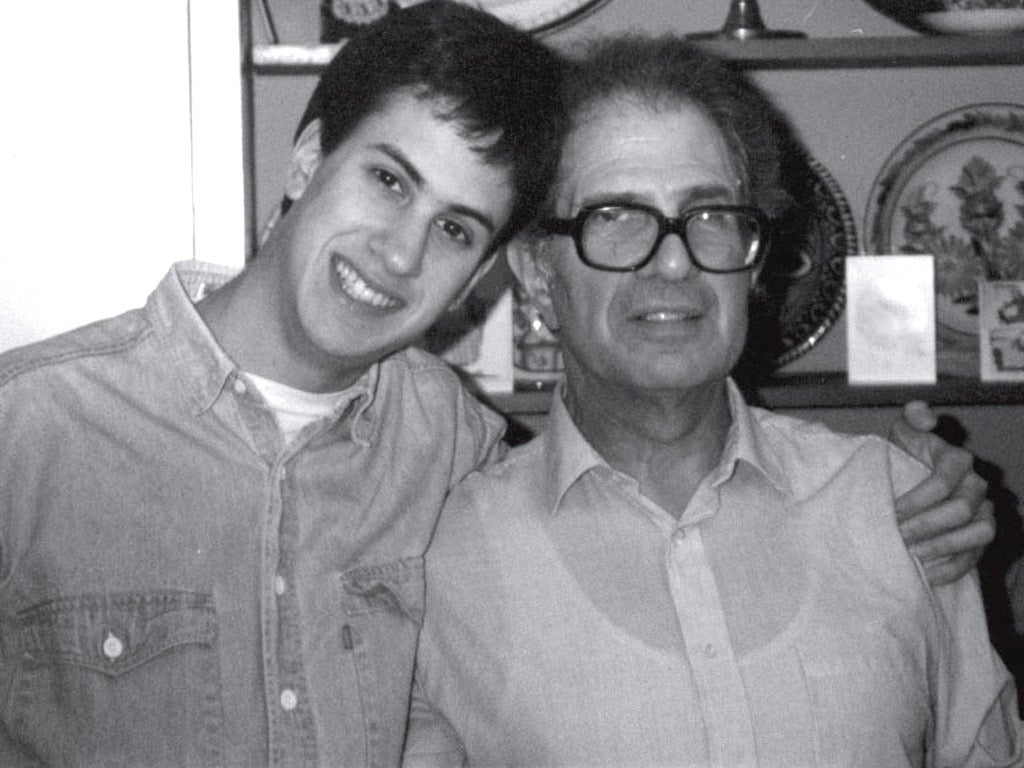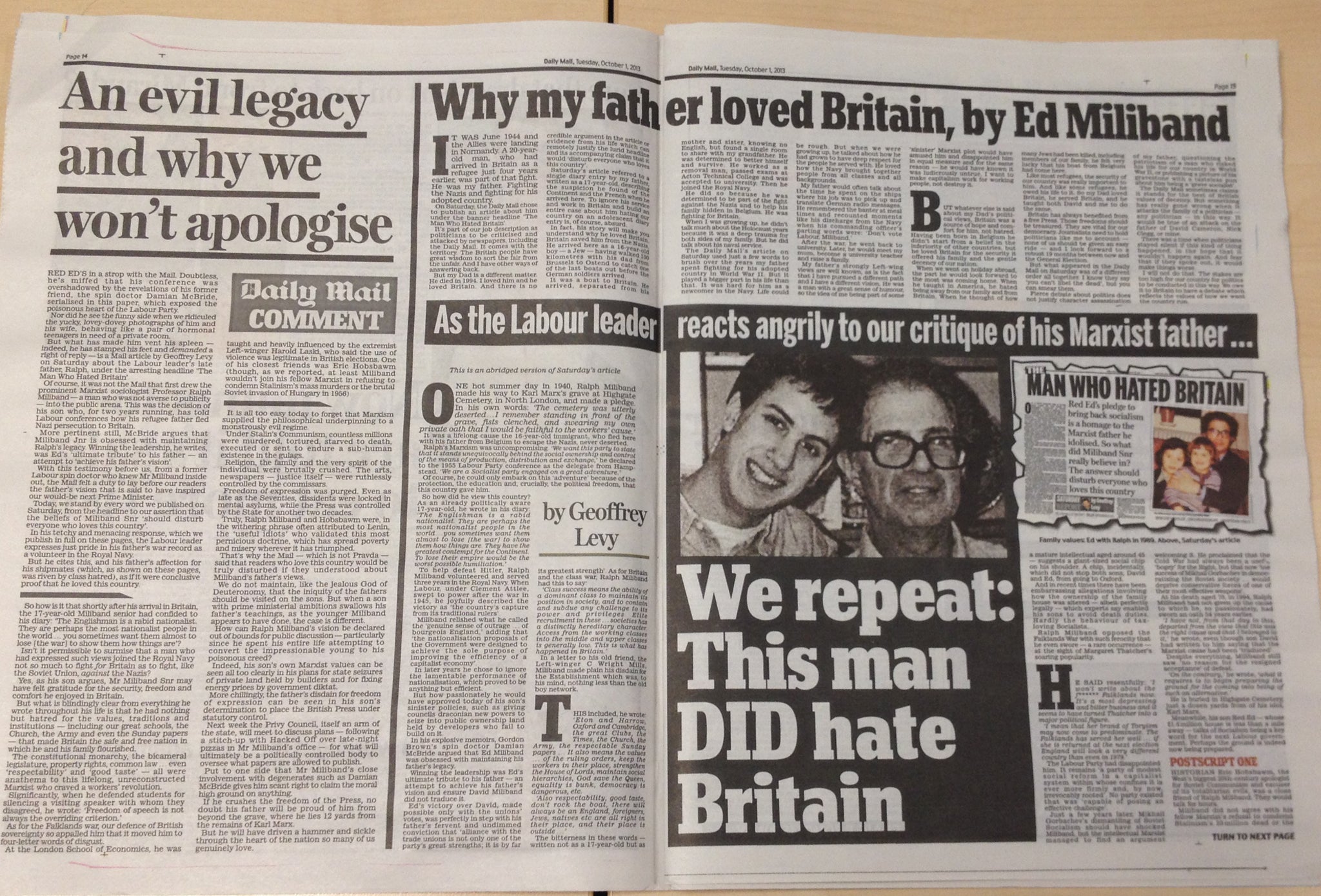'A man who hated Britain': Ed Miliband accuses Daily Mail of 'appalling lie' about his father Ralph
Newspaper stands behind its attack as Nick Clegg and David Cameron rally to support their political rival

Your support helps us to tell the story
From reproductive rights to climate change to Big Tech, The Independent is on the ground when the story is developing. Whether it's investigating the financials of Elon Musk's pro-Trump PAC or producing our latest documentary, 'The A Word', which shines a light on the American women fighting for reproductive rights, we know how important it is to parse out the facts from the messaging.
At such a critical moment in US history, we need reporters on the ground. Your donation allows us to keep sending journalists to speak to both sides of the story.
The Independent is trusted by Americans across the entire political spectrum. And unlike many other quality news outlets, we choose not to lock Americans out of our reporting and analysis with paywalls. We believe quality journalism should be available to everyone, paid for by those who can afford it.
Your support makes all the difference.Ed Miliband has accused the Daily Mail of propagating an “appalling lie” to smear his dead father as a “man who hated Britain”.
In a remarkable attack on the newspaper, the Labour leader said it had “overstepping” the boundaries of civilised debate by deliberately “besmirching and undermining” his father Ralph, who died in 1994.
Mr Miliband had earlier demanded a right to reply after the Mail published what he described as a “character assassination” based on a diary Ralph Miliband wrote when he was a teenager. But although the paper printed the Labour leader’s response, it did so alongside an abridged version of the original article and an editorial headlined: “An evil legacy and why we won’t apologise”. The editorial reiterated the Mail’s claim that Ralph Miliband had “nothing but contempt for Britain’s values, traditions and institutions” and suggested that Mr Miliband would like to censor discussion about his father’s past.
“Chillingly the father’s disdain for freedom of expression can be seen in his son’s determination to place the British press under statutory control,” it said. “If he crushes the freedom of the press, no doubt his father will be proud of him from beyond the grave, where he lies 12 yards from the remains of Karl Marx.”
Daily Mail deputy editor Jon Steafel defended the paper's article last night on BBC's Newsnight. He said: "We felt, and we think we produced evidence to support it, that he [Ralph Miliband] hated British values, and that his views in many areas were antipathetic to British values."
However, he conceded that using a picture of Ralph Milliband's grave, with the caption "grave socialist" for the Mail Online website was "an error of judgement", adding "which is why we didn't use it in the newspaper".
The Mail is at odds with Mr Miliband over his support for statutory regulation of the press as proposed by Lord Justice Leveson in response to the phone-hacking scandal. The Mail's editor, Paul Dacre, who is also chairman of an industry committee which writes and amends the Code of Practice that the PCC enforces, is adamant that statute should form no part of any new governance regime.
Mr Miliband said that he was “appalled” the paper had repeated the “lie” that his father hated Britain, saying: “I’m not willing to let my father’s good name be besmirched and undermined in the way that the Daily Mail are doing. It is about right and wrong. It is about how the way we conduct political debate in this country.”
A spokesman for the paper refused to back down from the attack, saying: “We ask fair-minded people to read our editorial. For what this episode confirms is that you cannot allow politicians anywhere near regulating the press. But Mr Miliband dismissed this. “This is not about regulation. It is about right and wrong,” he said.
He received support from Westminster, with the Lib Dem leader Nick Clegg saying that politics “should be about playing the ball, not the man, certainly not the man’s family”.

David Cameron also backed Mr Miliband, saying: “If anyone had a go at my father, I would want to respond very vigorously. There’s not a day goes by that you don’t think about your dad and all that he meant to you, so I completely understand why Ed would want to get his own point of view across.”
The Conservative MP Zac Goldsmith went further, pointing out that the Mail had been an enthusiastic supporter of the Nazis in the 1930s. Mr Goldsmith said it was “odd for a newspaper to judge a man on the basis of the history of his family when that newspaper is owned by a family that did more to pursue the Nazi cause prewar than any other [publication]”.
Referring to Harold Harmsworth, the first Viscount Rothermere and great-grandfather of the current proprietor, he said: “[Joseph] Goebbels himself wrote endless documents about Rothermere, describing him as being a strong ally and ‘strongly against the Jews’. Those are the words he used. Has Rothermere apologised? Have we ever had an apology from the Mail in relation to their history?”
In the original article, first printed in Saturday’s edition of the Mail, the writer Geoffrey Levy examined the political beliefs of the Marxist academic and how they influenced his two sons. The paper quoted the 17-year-old Ralph writing in his diary that the Englishman is a “rabid nationalist” and “you sometimes want them almost to lose [the war] to show them how things are”.
But Mr Miliband said politics did not justify “character assassination” of his father, who joined the Royal Navy and fought in the Second World War after arriving in Britain from Belgium. Mr Miliband has frequently referred to his father in speeches and how his values and experiences shaped him.
He wrote: “Like most refugees, the security of our country was really important to him. And like some refugees, he owed his life to it. So my Dad loved Britain, he served Britain, and he taught both David and me to do the same.”
He said he accepted politicians needed to be held to account but what appeared in the Daily Mail “was of a different order altogether”.
“I know they say ‘you can’t libel the dead’ – but you can smear them. Fierce debate about politics does not justify character assassination of my father, questioning the patriotism of a man who risked his life for our country or publishing a picture of his gravestone with a tasteless pun about him being a ‘grave socialist’. The Mail sometimes claims it stands for the best of British values... but something has really gone wrong when it attacks the family of a politician... in this way. It would be true of an attack on the father of David Cameron, Nick Clegg, or mine.”
Top targets: How the Press smells political blood
Neil Kinnock
The Labour leader was a long-standing victim of attacks by the right-wing press, culminating in the famous Sun headline on the day of the 1992 election. Picturing Mr Kinnock’s head in a light bulb, the paper wrote: “If Kinnock wins today will the last person to leave Britain please turn out the lights”.
Michael Foot
When he died, the Daily Mail columnist Richard Littlejohn suggested the former Labour leader had preferred to “sneer from the safety of the sidelines” rather than fight in the Second World War. The paper’s obituary described him as “the incarnation of socialist self-delusion” suggesting he was “drunk on the rhetoric of the Hampstead dinner party”.
Nick Clegg
In the build-up to the last election, the Daily Mail ran the front page headline: “Clegg in Nazi Slur on Britain”. It referred to an article he wrote in 2002 suggesting that while Germany had a “cross to bear” for the Second World War, Britain too needed to shake off its “tenacious obsession” with the last war. The Daily Mirror also mocked up a photograph of Mr Clegg with an extended nose under the headline “Pinickio” after the Lib Dems backtracked on their pledge to abolish tuition fees.
Ken Livingston
In the 1980s, when he was the leader of the Greater London Council, The Sun labelled him the “most odious man in Britain” for suggesting IRA attacks would continue for as long as British troops were in Ireland.
Join our commenting forum
Join thought-provoking conversations, follow other Independent readers and see their replies
Comments